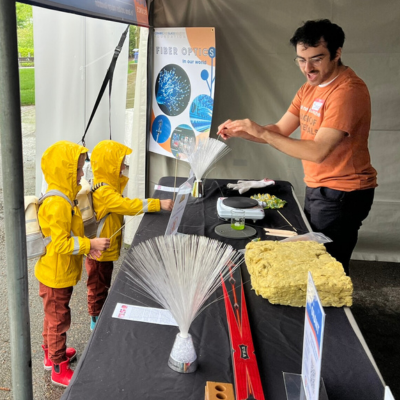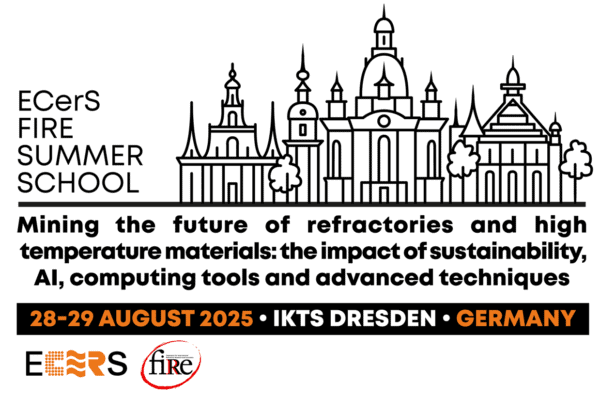The President’s Council of Student Advisors (PCSA), fresh from their autumn annual board meeting, hums with excited energy as a new year begins. With a recently-elected chair and visions for change, the PCSA readies itself to strengthen their organization and help even more students in the ceramic and glass community.
The PCSA primarily serves the American Ceramic Society (ACerS), but according to PCSA Chair and UC Davis Ph.D. student Fox Thorpe, they really are an organization that helps other students.
“Largely, I think we’re a group focused on serving students and so that’s the biggest reason (to support the PCSA),” Thorpe says. “If you’re passionate about students and you want a group that’s working for students, that is really in tune with student needs, that is students working for students to make grad school and make research and ceramics a better place for students in general, that’s what I think the PCSA’s mission is.”
The PCSA has five different committees: Conference Programming and Competitions, Communications, Recruitment and Retention, Education, and Professional Development. After a brainstorming session led by the new chair, Thorpe and the PCSA delegates decided to reorganize these committees. The Education and Professional Development Committees are new this year.
Formerly known as the Outreach Committee, the Education Committee now focuses on ensuring that all PCSA committees have the tools they need to conduct outreach activities, including conducting their own personal outreach activities. The Education Committee also works in conjunction with the Ceramic and Glass Industry Foundation (CGIF) to help incorporate the CGIF science kits into their outreach and volunteer with the foundation as needed.
Kristen Brosnan, Ph.D., served as an industrial mentor for the PCSA in 2010. At the time, Brosnan worked at GE Research, and attributes her connections to AcerS and the PCSA to opening more opportunities for her career.
“I didn’t volunteer with the PCSA to get anything back. Personally, that was not the goal,” Brosnan says. “I wanted to have fun and give back. And I will say it absolutely benefited my career.”

Brosnan is now the associate director of research and development at Collins Aerospace. One of her favorite memories about the PCSA is the Annual Business Meeting, when all the student delegates meet in person for networking, collaborating, and bonding.
“It’s so energizing, like it literally was the pick me up of the year for me because these are the future leaders and it’s just so energizing to see that much energy and passion in the room,” Brosnan says. “Because they are truly servant leaders, their focus is on volunteerism and helping others and I mean, who can’t get excited about that?”
As a young professional herself at the time, Brosnan fondly remembers setting up diverse career panels for the PCSA students she mentored. The new Professional Development committee aims to continue that growth by providing more career panels, more interaction with industry professionals, and more training opportunities.
The two committee shifts have marked significant change for the PCSA this year, but they still have more plans in the works: more international reach and improved support for young professionals in the ceramic and glass community.
The PCSA is an international organization, with delegates all over the world; the 2022-2023 class of delegates is made up of 46 students spanning eight countries. Last year, UC Davis Ph.D. student Isabella Costa brought a suitcase of CGIF Mini Kits with her to home country Brazil to expose students to materials science.

The PCSA plans to continue work like Costa’s in order to improve their reach and build upon international networks. Thorpe says that there are opportunities for some of the international, even national, PCSA delegates to get involved with the European Ceramic Society (ECerS) by attending their Summer School program or conferences.
As far as supporting young professionals, the PCSA recognizes the importance of retaining members in ACerS after they are no longer students. The Young Professionals Network, along with ACerS, succeed at providing post-grad opportunities for those looking to be involved like they were as a student. However, the PCSA still has plenty of opportunities for alumni to come back and assist with conferences, symposia, planning in subcommittees, and more.
For Thorpe, the benefits of the PCSA have extended even further past professional development.
“I joined the ceramics community with zero network, with zero knowledge and pretty much like nothing that I knew about materials science,” he says. “And now it’s been really big to just have a lot of friends who are studying ceramics… It’s been really good to have people to ask about jobs, internships, postdocs, just having a group of people who are studying the same things and have an interest in similar opportunities.”
The continued success and impact of the PCSA would not be possible without the support of donors who see the value in building a network of future ceramic and glass professionals.
Help us continue to inspire the next generation of ceramic and glass professionals. Give now at ceramics.org/donate.
Categories
- Feature Stories
- PCSA updates


